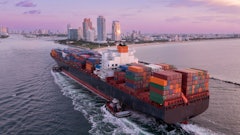New York — November 7, 2007 — The U.S. government has aggressively debated the merit of screening cargo prior to entering the country. The debate has ended. President George W. Bush recently signed into law (PL 110-53) the "Improving America's Security Act" (HR 1), which calls for the screening of container cargo for the purpose of securing borders against terrorist actions.
The hotly contested law is expected to bring additional burdens to the already cumbersome cross-border trade process by requiring screening of goods prior to vessel loading and opening the door to the imposition of additional maritime and surface transportation-related user fees for transportation security purposes.
The passage of this bill brings three critical questions to mind:
Background
HR 1/PL 110-53 implements most of the recommendations of the 9/11 Commission, a bipartisan group established to study the events surrounding the attacks of September 11, 2001, and make recommendations to prevent or minimize future terrorist events occurring on American soil.
The most noteworthy part of the legislation is Section 1701, regarding container scanning and seals. This section stipulates that by 2012, all sea cargo containers bound for the United States must be scanned. In other words, 100 percent of cargo on a ship with a U.S. port of call at any point on their itinerary must be scanned.
Scanning must be performed by non-intrusive imaging equipment and radiation detection equipment prior to loading onto the vessel. Military cargo would be exempt from the scanning requirement. This includes supplies bought by the Secretary of Defense and transported in compliance with Section 2631 of Title 10, U.S. code, and the military cargo of foreign countries.
It is important to note that the Secretary of Department of Homeland Security (DHS) may waive the 100 percent scanning requirement for up to two years (with renewal) if the Secretary certifies to Congress that suitable technology is not available; overseas port are not able to purchase, deploy or operate the technology; or the requirement has an unbearable impact to trade and cargo flow. This stipulation is an easy way out of a burdensome requirement that is not favorably supported by industry or U.S. trading partners.
The World Reacts
The passage of HR 1 has understandably provoked the ire of trading nations. Partnership in global trading organizations such as the World Trade Organization (WTO) and World Customs Organization creates an obligation for each member country to maintain a fair and consistent trade policy towards the other member states. In reaction to the enactment of this law, the European Union (EU) was predictably critical of it as a restraint on international trade. It said that the United States is unilaterally and without coordination with its trading partners transferring the resource burden for protecting the United States from itself to its trading partners. It also held out the possibility that the EU would look into whether the new law violates the WTO rules as European businesses may suffer more than their U.S. counterparts.
It is probable that the cargo screen law violates U.S. obligations under the WTO. As such, paragraph 8 of the law provides that the DHS Secretary must ensure that any actions undertaken pursuant to this scanning requirement do not violate international trade obligations and are consistent with the World Customs Organization framework or other international obligations of the United States. Therefore, it appears unlikely that the United States will do anything to jeopardize the balance of trade.
If the EU does bring a WTO complaint against this new law, and if the WTO rules that it violates the international obligations of the United States, by the terms of the law itself, the DHS Secretary would have to bring the administration of the law into conformity with U.S. international obligations. However, any legal enforcement of a WTO decision against this requirement would certainly take years to have an effect. Most likely, other countries would retaliate by imposing the same requirements on goods exported from the United States to their countries, thereby adding to the burdens of international trade.
Congress Wants Cargo Screening Measures in Place
Many agree cargo screening is a good idea, in theory; however, trade professionals know that the imposition of this idea without negatively impacting cross border trade is not realistic. There is doubt that adequate technology exists or will be developed and deployed in time to meet the 2012 deadline. However, it is interesting to note that Congress has mandated a cargo screening requirement — a concept that the Customs and Border Protection (CBP) agency within DHS has been waffling on for several years.
HR 1 mandates by October 15, 2008, the use of high-security seals meeting the requirements of the International Organization for Standardization Publicly Available Specification 17712 on all sea containers in transit to the United States. This requirement terminates upon CBP promulgating such regulations. Up to this point, CBP has not published proposed regulations requiring high-security seals on containers, though C-TPAT participants are already required to use these seals.
Therefore, it would be prudent for all U.S. importers to employ these seals for all their cargo imported by sea container. As this has been anticipated by Trade for several years, there should be little outrage regarding the additional cost.
Hidden Fees for the Industry
Industry is well aware of the fees involved with global trade. Currently the government imposes a merchandise processing fee on many imported goods and a harbor maintenance tax on goods imported by vessel at most sea ports.
HR 1 Section 1308 requires that DHS conduct a study of the need for establishing a system of maritime and surface transportation-related user fees to provide necessary funding for improvements to and maintenance of maritime and surface transportation security. This is in addition to the current harbor maintenance tax and merchandise processing fees levied on imported cargo.
It is possible that Congress could use HR 1 to collect additional money from U.S. importers. This is something that should be closely monitored. The trade community should not be made to bear the brunt of the cost of the U.S. security operations in addition to the considerable cost it is already undergoing to ensure that its international supply chain is as impregnable as possible.
The Reality of the Cargo Screening Law
While it seems obvious that HR 1 will place an additional burden on goods imported into the United States by sea containers, it is unlikely that implementation and enforcement of its requirements will happen any time soon.
HR 1 has an important caveat — the law may be deferred if various conditions are not met. These conditions include the availability of technology, concerns regarding violations of international trade regulations, and catastrophic impacts to the U.S. trade balance. Not only are there valid doubts as to the availability of functional technology but there is also outrage within the international trading community. It's quite likely that those conditions will not be met in the foreseeable future.
Nevertheless, U.S. importers should prepare for the future. Industry should proactively work with DHS to develop technology, processes and procedures that will minimize the cost and disruption that the 100 percent scanning requirement might otherwise cause if implemented in a hasty and cavalier fashion.
The hotly contested law is expected to bring additional burdens to the already cumbersome cross-border trade process by requiring screening of goods prior to vessel loading and opening the door to the imposition of additional maritime and surface transportation-related user fees for transportation security purposes.
The passage of this bill brings three critical questions to mind:
- Can the United States mandate trade activity in another country?
- Is the U.S. Government mandating security requirements for industry?
- Can businesses absorb these additional global trade fees?
Background
HR 1/PL 110-53 implements most of the recommendations of the 9/11 Commission, a bipartisan group established to study the events surrounding the attacks of September 11, 2001, and make recommendations to prevent or minimize future terrorist events occurring on American soil.
The most noteworthy part of the legislation is Section 1701, regarding container scanning and seals. This section stipulates that by 2012, all sea cargo containers bound for the United States must be scanned. In other words, 100 percent of cargo on a ship with a U.S. port of call at any point on their itinerary must be scanned.
Scanning must be performed by non-intrusive imaging equipment and radiation detection equipment prior to loading onto the vessel. Military cargo would be exempt from the scanning requirement. This includes supplies bought by the Secretary of Defense and transported in compliance with Section 2631 of Title 10, U.S. code, and the military cargo of foreign countries.
It is important to note that the Secretary of Department of Homeland Security (DHS) may waive the 100 percent scanning requirement for up to two years (with renewal) if the Secretary certifies to Congress that suitable technology is not available; overseas port are not able to purchase, deploy or operate the technology; or the requirement has an unbearable impact to trade and cargo flow. This stipulation is an easy way out of a burdensome requirement that is not favorably supported by industry or U.S. trading partners.
The World Reacts
The passage of HR 1 has understandably provoked the ire of trading nations. Partnership in global trading organizations such as the World Trade Organization (WTO) and World Customs Organization creates an obligation for each member country to maintain a fair and consistent trade policy towards the other member states. In reaction to the enactment of this law, the European Union (EU) was predictably critical of it as a restraint on international trade. It said that the United States is unilaterally and without coordination with its trading partners transferring the resource burden for protecting the United States from itself to its trading partners. It also held out the possibility that the EU would look into whether the new law violates the WTO rules as European businesses may suffer more than their U.S. counterparts.
It is probable that the cargo screen law violates U.S. obligations under the WTO. As such, paragraph 8 of the law provides that the DHS Secretary must ensure that any actions undertaken pursuant to this scanning requirement do not violate international trade obligations and are consistent with the World Customs Organization framework or other international obligations of the United States. Therefore, it appears unlikely that the United States will do anything to jeopardize the balance of trade.
If the EU does bring a WTO complaint against this new law, and if the WTO rules that it violates the international obligations of the United States, by the terms of the law itself, the DHS Secretary would have to bring the administration of the law into conformity with U.S. international obligations. However, any legal enforcement of a WTO decision against this requirement would certainly take years to have an effect. Most likely, other countries would retaliate by imposing the same requirements on goods exported from the United States to their countries, thereby adding to the burdens of international trade.
Congress Wants Cargo Screening Measures in Place
Many agree cargo screening is a good idea, in theory; however, trade professionals know that the imposition of this idea without negatively impacting cross border trade is not realistic. There is doubt that adequate technology exists or will be developed and deployed in time to meet the 2012 deadline. However, it is interesting to note that Congress has mandated a cargo screening requirement — a concept that the Customs and Border Protection (CBP) agency within DHS has been waffling on for several years.
HR 1 mandates by October 15, 2008, the use of high-security seals meeting the requirements of the International Organization for Standardization Publicly Available Specification 17712 on all sea containers in transit to the United States. This requirement terminates upon CBP promulgating such regulations. Up to this point, CBP has not published proposed regulations requiring high-security seals on containers, though C-TPAT participants are already required to use these seals.
Therefore, it would be prudent for all U.S. importers to employ these seals for all their cargo imported by sea container. As this has been anticipated by Trade for several years, there should be little outrage regarding the additional cost.
Hidden Fees for the Industry
Industry is well aware of the fees involved with global trade. Currently the government imposes a merchandise processing fee on many imported goods and a harbor maintenance tax on goods imported by vessel at most sea ports.
HR 1 Section 1308 requires that DHS conduct a study of the need for establishing a system of maritime and surface transportation-related user fees to provide necessary funding for improvements to and maintenance of maritime and surface transportation security. This is in addition to the current harbor maintenance tax and merchandise processing fees levied on imported cargo.
It is possible that Congress could use HR 1 to collect additional money from U.S. importers. This is something that should be closely monitored. The trade community should not be made to bear the brunt of the cost of the U.S. security operations in addition to the considerable cost it is already undergoing to ensure that its international supply chain is as impregnable as possible.
The Reality of the Cargo Screening Law
While it seems obvious that HR 1 will place an additional burden on goods imported into the United States by sea containers, it is unlikely that implementation and enforcement of its requirements will happen any time soon.
HR 1 has an important caveat — the law may be deferred if various conditions are not met. These conditions include the availability of technology, concerns regarding violations of international trade regulations, and catastrophic impacts to the U.S. trade balance. Not only are there valid doubts as to the availability of functional technology but there is also outrage within the international trading community. It's quite likely that those conditions will not be met in the foreseeable future.
Nevertheless, U.S. importers should prepare for the future. Industry should proactively work with DHS to develop technology, processes and procedures that will minimize the cost and disruption that the 100 percent scanning requirement might otherwise cause if implemented in a hasty and cavalier fashion.

















